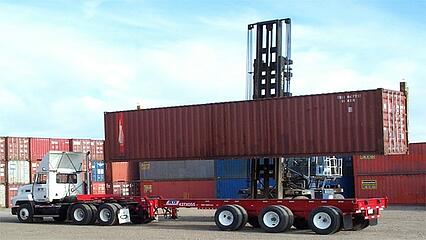 While 53’ domestic intermodal can be a fantastic alternative to truckload, it does not make sense in all cases.
While 53’ domestic intermodal can be a fantastic alternative to truckload, it does not make sense in all cases.
In our article entitled Comparing Truckload vs Intermodal: 11 Differences Shippers Should Know, we went into great detail on the freight characteristics that work best for both 53’ freight modes, but skimmed over the topic of restricted and prohibited commodities.
Definition of Prohibited and Restricted Intermodal Commodities
The quick answer to prohibited products are items that, without exception, are not allowed to travel via the rail infrastructure, while restricted products have rules and regulations that a shipper needs to follow for the shipment to move legally via intermodal rail.
As with a number of situations in logistics, there is more to the story, so let us take a deeper look into both.
Prohibited vs. Restricted Intermodal Commodities in More Detail
 While we’ve talked with 100’s of shippers wanting to bring an intermodal strategy into their logistics strategy, we have run into very few situations where a shipper has either a restricted or prohibited intermodal commodity, we thought no better time than the present to take a deeper dive into the topic.
While we’ve talked with 100’s of shippers wanting to bring an intermodal strategy into their logistics strategy, we have run into very few situations where a shipper has either a restricted or prohibited intermodal commodity, we thought no better time than the present to take a deeper dive into the topic.
Prohibitive Intermodal Commodity
A prohibited intermodal commodity is any substance that cannot be loaded onto a container under any circumstance.

Restricted Intermodal Commodity
 Restricted commodities are acceptable to be loaded on an intermodal container, although with caveats and limits.
Restricted commodities are acceptable to be loaded on an intermodal container, although with caveats and limits.
An important point to make on restricted commodities is they can travel via rail, but the cargo liability coverage may be subject to reduced levels.
- Example: Household Goods Freight (HHG) may be restricted, with a $500 cargo liability coverage policy associated with it. An interesting point with HHG is it may be restricted with one intermodal service provider (IMC) and prohibited from even moving on the rail with the same (IMC).
Another point to make is some commodities can be completely acceptable under certain circumstances, but restrictive or prohibited under other situations.
- Example: The determining factor to ship steel coils via intermodal is weight. Coils weighing 3,500 lbs. or less can run as a standard commodity, but under a limited liability basis of $500 per load. Coils over 3,500 lbs. are considered a restricted commodity, which the BCO shipper is required to enter into an agreement that outlines the liabilities and restrictions, along with the limited liability coverage given to the steel coil loads.
While restricted and prohibited intermodal commodities would seem to be a cut-and-dry situation, there are a number of twists that make the topic a bit confusing. With that in mind, we recommend working closely with a reputable IMC to ensure your company's commodities are appropriate for intermodal transport.
Restrictive and Prohibitive Intermodal Commodities by Railroad
As was mentioned earlier not all class I railroads have the exact same designations or rules, so to understand if your company’s product falls under either restrictive or prohibitive we have provided the links to each site below. The other option is to give us a call and we can also help guide your journey.
Additional Articles on Intermodal Transportation:
Hopefully you found the above information to be helpful and if ever you are looking at alternatives to your shipping needs we here at InTek would like to be a part of that conversation.
If you're ready to take the next step, at InTek Freight & Logistics, we can help. Just tell us what you need and we'll discuss how our expertise can help with the unique shipping challenges your business faces. Rather do a bit more research first? View our Freight Guides for comprehensive articles and eBooks on all things freight and logistics.

